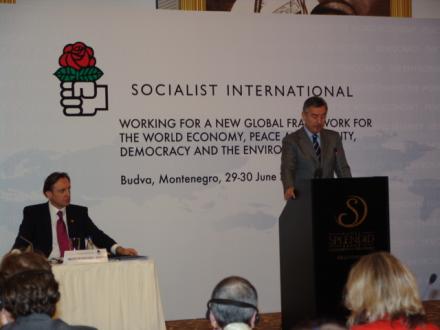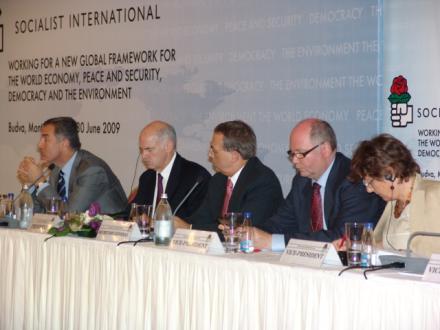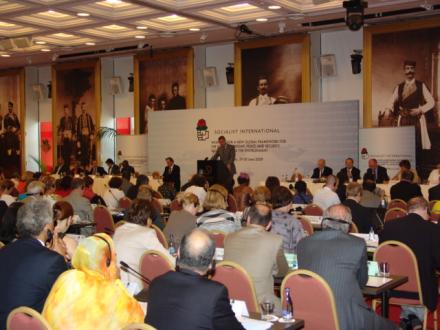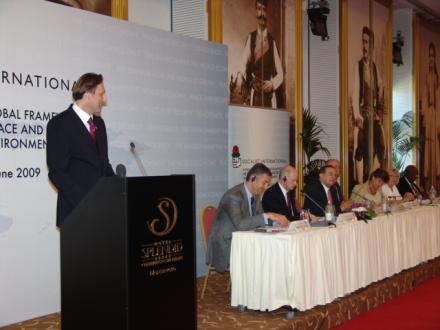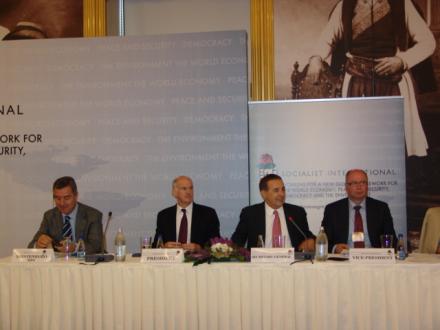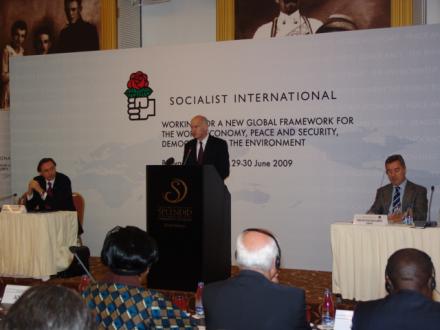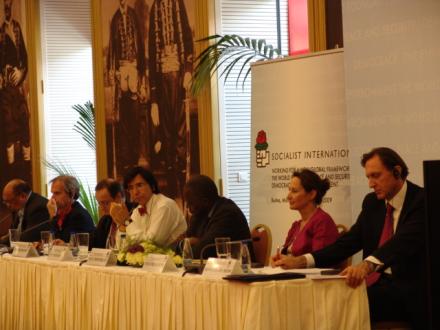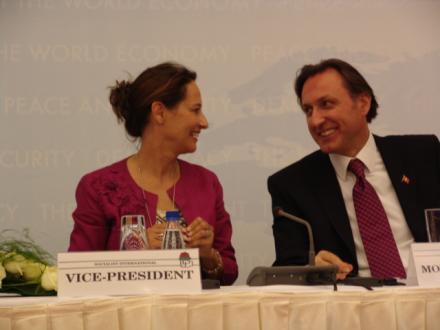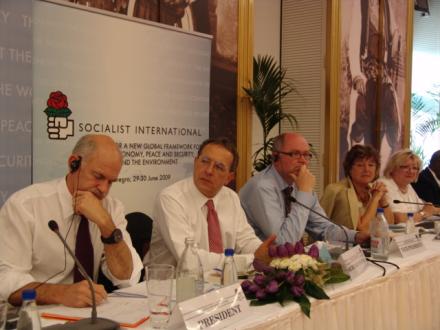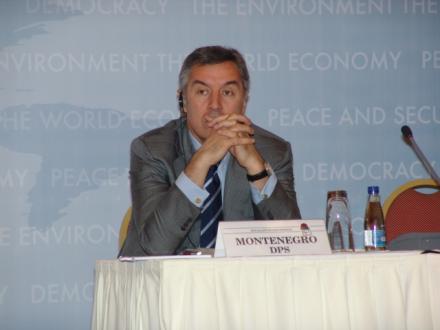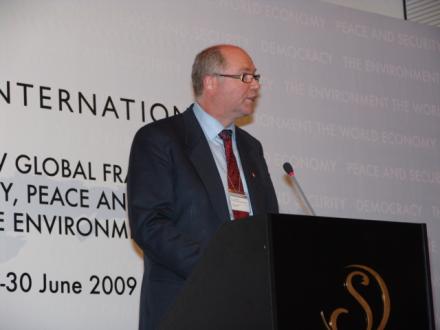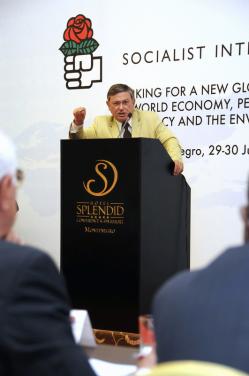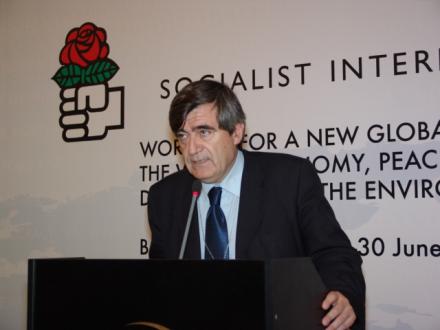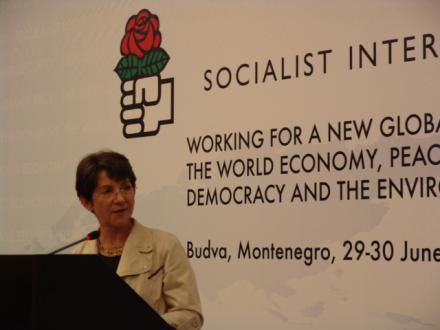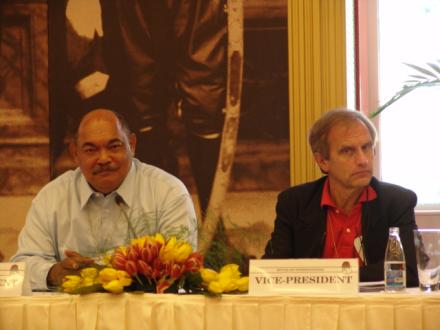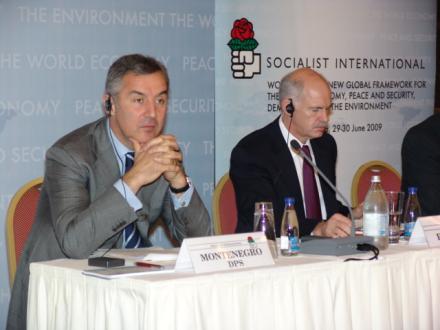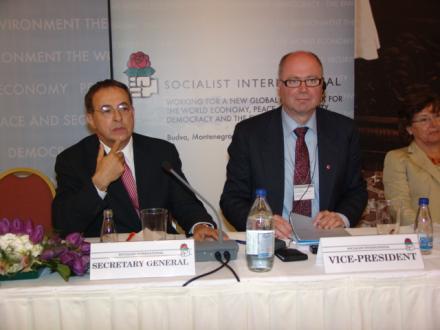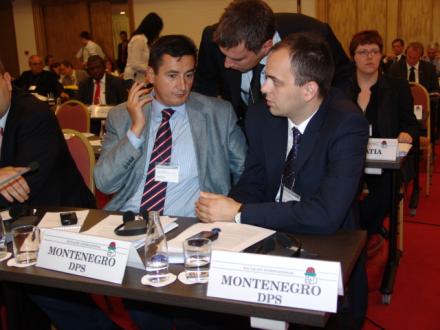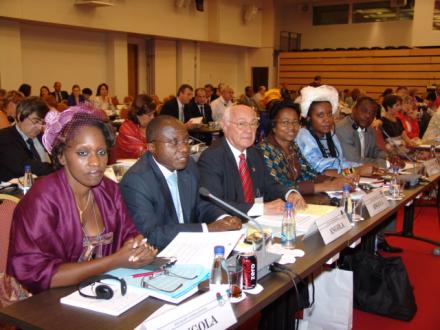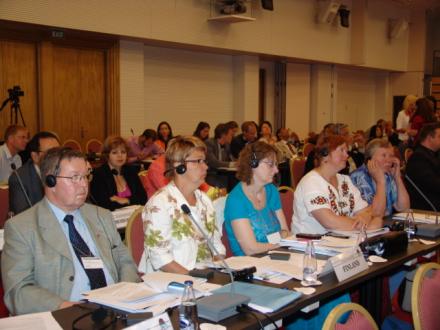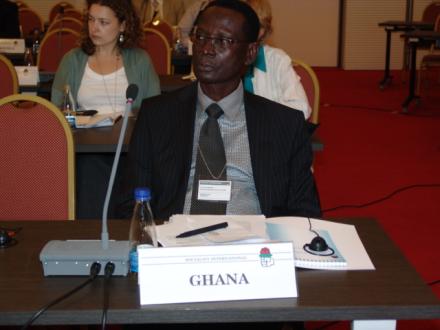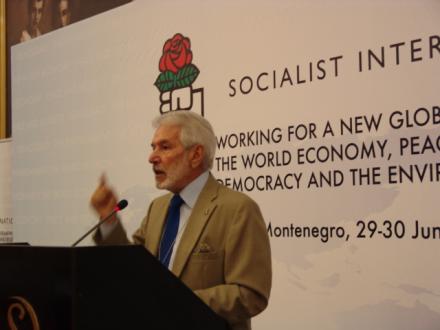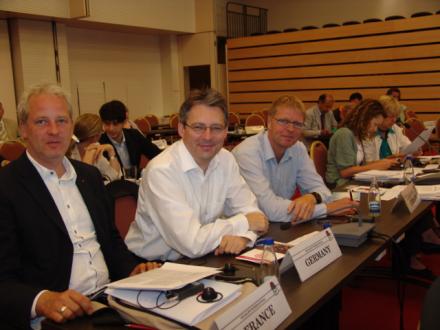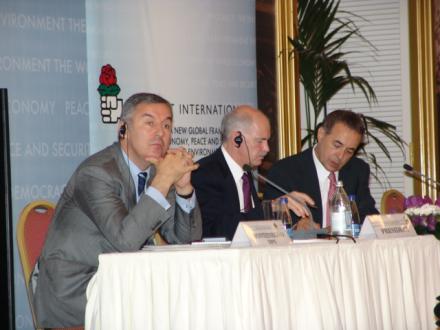CONSEIL DU MONTENEGRO
CONSEIL DU MONTENEGRO – Travailler pour un nouveau cadre global pour l’économie mondiale, la paix et la sécurité, la démocratie et l’environnement
29-30 juin 2009
Discours de George A. Papandreou, Président de l’Internationale Socialiste et Président
du PASOK au Conseil de l’IS au Monténégro
Dear friends, dear comrades,
I would like to thank our hosts for their hospitality. I would like to thank Milo Đjukanović, Prime Minister and leader of the Democratic Party of Socialists of Montenegro, for his hospitality. I would like to also thank Ranko Krivokapić, President of the Parliament and leader of the Social Democratic Party of Montenegro.
I’d like to say that we are encouraged by the political success of you, the social democrats in your country. But we are also inspired, and thank you very much, by the beauty of Montenegro and the setting you have chosen for our work. Coming from Greece, I feel very much at home here.
Our common European project is to me, and I believe to all us socialists, a progressive project. After World War II the European project was able to transform this continent from nations divided by war and ethnic conflicts, dictatorships and authoritarian regimes, hatred and racisms, walls that divided us. We were able to transform this continent to a family of common values, those of peaceful resolution of conflict, of respect of territorial integrity, rule of law rather than the rule of the powerful, democracy and protection of human rights, solidarity and prosperity.
In 1914 World War I started in this region. But since then this region has still remained divided or immersed in conflict. So it is an historical necessity that this region becomes part of this wider peaceful project called the European Union.
Today the Western Balkans of which you are a part still remain outside this family, which now unluckily talks about enlargement fatigue. So the European Union must provide the political will, the time, the hard work and the funding, and you every effort, so that your societies are transformed to meet the criteria for membership in this wider family of values.
I personally would suggest that a roadmap is defined, that arrives at accession of all the Western Balkans to the European Union by 2014, exactly 100 years after World War I. We can turn the page on an era that began a century ago.
As a neighbour, as a socialist that believes in the European project, I will continue to work with you and our European partners to achieve this goal.
We are in a very special part of Europe. And Europe only recently has had elections, European elections, a very unique political process, unlike anything elsewhere in the world, anywhere in the world. A meeting of sovereign nations and peoples to elect a common parliament and representation.
But this unique project called Europe is suffering. It is in a crisis, a crisis of identity, an economic crisis, a social crisis, a cultural crisis, a crisis of values. And I deeply believe that we either have a social, green and democratic Europe, or we will see Europe slow down, become dominated by fear, revert to extreme nationalisms and racisms, with our citizens becoming either more apathetic or more rejectionist. A Europe dominated by neoconservative ideology.
And this is our challenge. We know that our values, our ideas, our principles today are more relevant than ever. And that is both in Europe, but also in the world. Whether it is local politics or global affairs, our values today can and must become a catalyst for a better world.
We know that, and this has become our responsibility as socialists, as democrats, as the Socialist International.
We know that the world needs to deal with poverty decisively, through real solidarity, by fighting inequality, by fighting illiteracy, by fighting pandemics collectively, such as HIV/AIDS.
We know that the world needs to deal with corruption, which is undermining the rule of law, and do so by supporting institutions, democratic institutions with guaranteed transparency in governance.
We know that our citizens often feel powerless, but they see so much concentrated power in the hands of a few, where there is a world of money, technology and knowledge, which however can transform and change societies. But the question is: In what direction? And for whom? And by whom?
We know that there is only one way for peace and progress. Our societies must be more equal, more just, more humane. Our citizens must be empowered.
We know that the ideologies of free markets, which have failed us, talked of freedom, but only measured freedom in terms of the money one had to consume or the credit the banking system extended.
Yet when we talk of freedom we mean the real power, the real power one has to decide on the direction his or her neighbourhood, or city, or village, or nation will take.
We speak of citizens, not simply of consumers.
When we speak of empowering our peoples, we mean each and every individual, ensuring human rights, gender equality, due and democratic processes. But empowerment for us also means the power of collective action, whether it is in the traditional sense of collective bargaining, parties, trade unions, or whether collective action is through NGOs, Facebook, Twitter, YouTube, or many other new technologies that allow for new forms of active citizen participation and empowerment.
We know that we must deal with xenophobia and racism, in a democratic way. We need to accommodate differences, different political views, different cultures, different ethnicities.
Make it a creative process which is helpful to all, rather than a fear.
We need global solutions that deal with the root problems that cause migration and refugees. Otherwise, fear and suffering will create new walls of inequality, social tension and marginalisation in our societies.
We know that the proliferation of nuclear arms is a guarantee for future catastrophes on our planet, and that we need collective global cooperation and strong international treaties.
We know that our world will not survive if we do not transform our methods of production into green technologies, if we do not transform our energy sources into sustainable and renewable resources.
And we know, as socialists and as democrats, that this process of transformation, this process of change, must be one that is owned by our citizens, one where we guarantee their participation, their education, their skills, their strengths, their creativity, their security.
We know this. We know this is the only way to deal with the magnitude of the challenges we face as a global society.
Yes, our principles, our values are of greater relevance than ever.
Yet we also know that we are facing formidable forces, forces that want to preserve the status quo, that fear of losing too much, even though they have more than they and their grandchildren’s grandchildren could ever consume. Huge concentrations of power, wealth, media, which are able to capture or even corrupt our democratic institutions.
We know that neoconservatives steal our slogans, even our programmes, but never believe in them.
We know that neoconservatives cultivate fear and manipulate emotions and people’s sensitivities, in their attempt to dominate, while we want to liberate.
And we know, when all else fails, that they try to make us believe that there is no alternative, that it is all in vain, all is hopeless. And so they try to create apathy, cynicism, and people giving up the struggle for change. And the battle is certainly lost, if it is a battle which is never fought.
That is why we in the SI are waging an all-important battle. Our relevance is to wage the battle of ideas. And the work we do is to support these social democratic and green ideas with concrete proposals, analysis, understanding and initiatives, to support our member parties in their struggles, to bring out our best practices from our collective experience.
That is why we have set up and supported committees and commissions in the Socialist International, on most of the major challenges our global society faces.
And we know today, more than ever, that our fight is as important at our national and regional level as it is on the global, planetary level.
For now more than ever, more than ever before in humankind’s history, our local agenda is also our global agenda. That is why we strive to be present, active, with concrete proposals, social democratic alternatives, on all major issues and gatherings.
Our Council here in Budva is taking place just a few weeks before the G8 meeting in Italy, which will again deal with the financial crisis, and just a few months before the climate conference in Copenhagen in December. These two summits should not be seen in isolation.
We are in desperate need of a financial system which can serve the priorities of our global societies and citizens, not a financial system that simply worries about banks and bankers.
We need a financial system that will invest in the transformation of our economies, particularly developing and emerging economies, into green economies.
We need a financial system that will empower the bottom billion of the poorest in the world.
We need a financial system that will invest in human capacity, education.
In March, our Commission on Global Financial Issues, chaired by Joseph Stiglitz, met at the United Nations headquarters in New York. We invited leading international experts to join us, to develop specific policy proposals that combine urgent measures to overcome the current crisis, along with far-reaching reforms to safeguard social cohesion and social justice.
To this end, we called for greater financial transparency, more robust regulation, the closure of tax havens, the creation of a world finance organisation to set and enforce global standards, standards that will develop a world of equity, a world for green development.
And the crisis is by no means over. The world is still on shaky ground, as we all feel the aftershocks of this financial crisis.
So now is the time for major changes. Many of the measures taken to bail out failed banks and shore up ailing industries seem designed to simply perpetuate a global financial system that is both politically and morally bankrupt.
Fixated on saving banks, governments are paying little attention to the people who are losing their homes and jobs, their savings and pensions, as a result of financial decisions way beyond their control.
This is where we can and must fill the vacuum. And this is not just about redistribution of wealth. It’s also about taking responsibility for change.
During our last Council meeting in Mexico, we discussed how the global financial crisis impacts on the world’s poorest nations. We discussed how immigrants are also deeply affected by the economic crisis, a factor that has slowed the vital flow of remittances to developing countries.
The United Nations Millennium Development Goals are falling far short of their targets. There has been a worrying lack of progress on HIV/AIDS, education, fighting poverty and climate change.
The Multilateral Debt Relief Initiative launched by the G8 in 2005 has proved useful. However, we should and must go further. Cancellations of the Debt Relief Initiative for eligible countries must be de-linked from harmful economic conditionalities that have only increased poverty and have not helped social cohesion in many of these developing countries.
We must stop debt payment flowing out of countries crippled by extreme poverty. Haiti is a case in point, as elaborated at the first meeting of our Committee on Social Cohesion, Poverty and HIV/AIDS in Vienna just a few weeks ago.
Alongside steps to stabilise the financial system, we propose labour market policies that create jobs, reduce unemployment, help small and medium-sized companies, and maintain social protection. The ILO Decent Work Agenda has included many interesting ideas on this question, which we have incorporated.
The financial crisis is also an opportunity, a challenge to rethink our priorities and restructure our economies. Our Commission for a Sustainable World Society chaired by Ricardo Lagos and Göran Persson will present specific proposals and recommendations to the United Nations Climate Change Conference in Copenhagen in December.
The Commission has already engaged in high-level talks in Latin America, in Europe, in Russia and in Africa.
Only a few weeks ago, I was with this Commission, which met in Beijing, where we engaged in frank and productive dialogue on environmental issues, on the financial crisis, with the Chinese President, as well as the ministers who are responsible for negotiating the Copenhagen Agreement. This shows that the Socialist International is playing an important role in creating a new consensus around the world.
Environmental concerns had become a blame game. The developed world fears the depletion of vital resources by the developing world, which in turn blames the developed world for destroying the environment in pursuit of profit.
I had the opportunity in China to state very clearly that this is where a different financial system could play a new role, in helping, supporting, investing. Investing in emerging and developing countries, so that they can transform their technologies, their knowledge, their skills, so as to become green economies.
The policies to address climate change can and must be tools that we use to overcome the current financial crisis and the inequalities it is creating. Instead of obstacles, green development can be an instrument to revitalise our economies.
In September we will meet in New York with US environmental policymakers, with whom we are already engaged in a dialogue. And we will present the UN General Assembly with a set of proposals that represent the common will of our 170 parties worldwide. This will help us build a progressive consensus around environmental issues and climate change, coming to Copenhagen.
It is in the vital interests of both developing and developed countries to move forward. Developing countries not to make the mistakes the developed countries have made in the past, but also developed countries to take on the responsibility to help developing countries in their efforts to move to a low-carbon, energy sustainable development.
So this is where the work of our Commission has been absolutely necessary and vital, not only for our movement but also for the world.
Linked to this new development model is the issue of energy, which in turn is linked with issues of peace and security. This is because the increasing scarcity of resources already has, but could lead to even further severe conflicts in the future.
World peace depends on collective action to develop alternative sources of energy, as well as diplomatic efforts to achieve global disarmament. President Obama’s recent pledge to support non-proliferation gives us cause of optimism.
On the other hand, nuclear testing by North Korea poses a serious threat to our commitment to a world free of nuclear weapons. And this is one of the issues we will be discussing.
In order to re-energise the global disarmament agenda, at our last congress we established a Committee on Disarmament. This committee had its first, very successful, meeting in Berlin in April, with participants from India, from Pakistan, from China, from Russia and from the US, among others.
Fighting for global disarmament should not distract us from efforts to reduce military expenditures in our own countries, especially at a time of economic crisis. This is something, for example, which I myself am a proponent of in our region, particularly between Greece and Turkey, a proposal I have made in order to lower the expenditures of military procurements.
Huge sums of money could be redirected towards health, education and social protection, if countries with big defence expenditures would rationalise their budgets. This could also be a powerful incentive to resolve conflict.
Contributing to conflict resolution through multilateral dialogue is an area where the Socialist International can really make a difference. And as a member of our Committee on Disarmament has said, we have, as social democrats, an historical tradition, a tradition in conflict resolution and peace initiatives.
So through our Committee on Peace we will work on these issues in even greater depth in the coming months.
Finally, we in our Council today and tomorrow will discuss a fundamental issue to our movement: democracy. Democracy today is under threat, whether it is the new authoritarianism, which our comrades in Africa highlighted recently in Dakar, whether it is in Honduras, whether it is the concentration of media in the hands of a very few, where even a stable democracy like Italy is witnessing under Berlusconi this ultra-concentration of media power.
Whether it is the undermining of transparency through corruption, money laundering, lobbyists, which often capture our democratic institutions, whether it is from Wall Street in the US, or even in my country, where multinationals have been seen to try to buy up political favours, the fight for democracy, the fight for the empowerment of our citizens is vital, vital for our security, for our prosperity, for our stability, for social cohesion.
So the Socialist International needs to map out these new challenges to our democratic institutions, but also incorporate new opportunities to empower our citizens, as for example we have seen in Obama’s campaign in the United States, but also recently with the use of new technology in Iran.
To fail to democratise globalisation, this will mean that people will lose hope in the power of democracy and find hope, false hope, in extremism, fundamentalism and violence. And we know this is not the path to a sustainable world.
Dear friends and dear comrades, the challenge to our democratic global governance, to creating a democratic global governance, is immense. But I remain optimistic.
We know that the risks of doing nothing to restore legitimacy to our institutions, to bail out banks without financing development for the disadvantaged, to fail to invest in low-carbon technology and clean up industry, this would mean that our planet, our civilisation will fail.
And social democracy is the answer. It is the answer to these questions. We know this today more than ever.
And as President of the Socialist International, I would like to thank you all, all parties and all members of your parties, all those who are participating actively in the Socialist International and on the commissions and the committees, for the work you are doing, for the work we are doing, in order to make social democratic, socialist and progressive ideas prevail in the world.
We must prevail, and we will prevail. We will bring change to our planet. Thank you very much.









